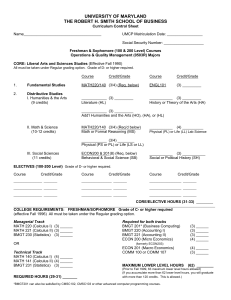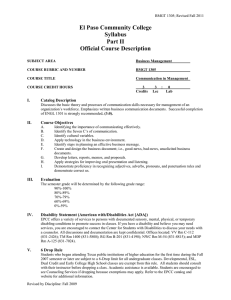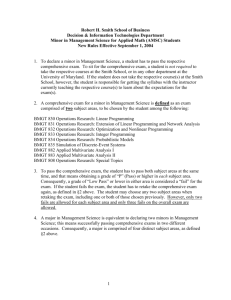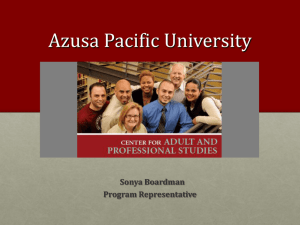MARYLAND -~' UNIVERSITY OF
advertisement
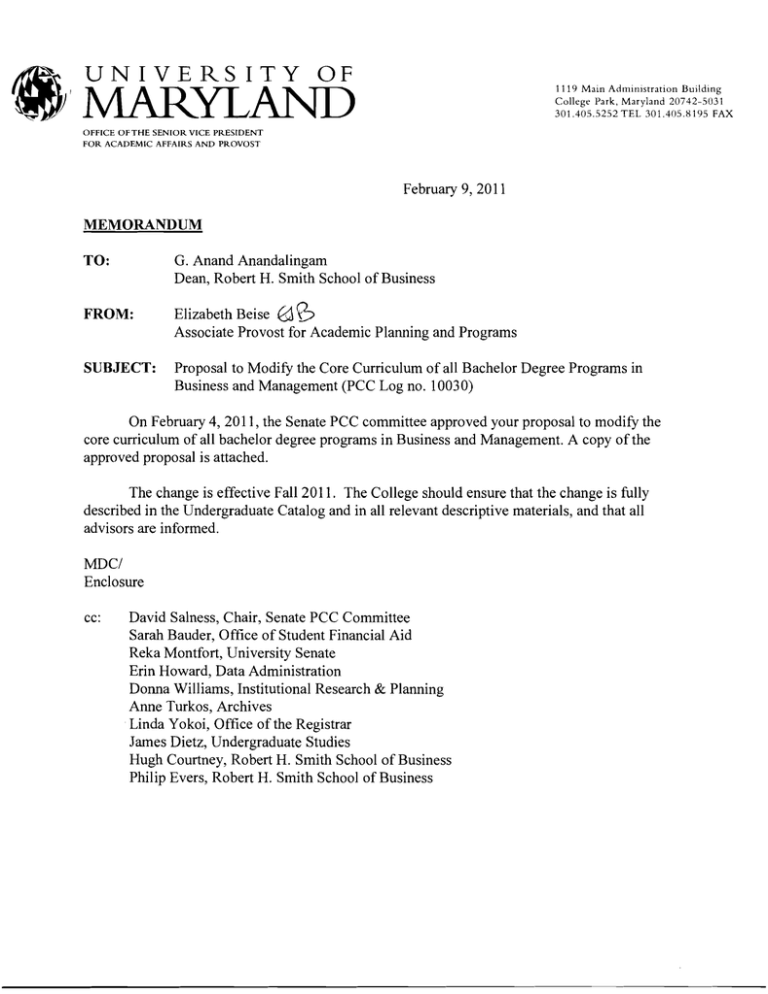
~.
-~'
UNIVERSITY OF
MARYLAND
1119 Main Administration Building
College Park, Maryland 20742-5031
301.405.5252 TEL 301.405.8195 FAX
OFFICE OFTHE SENIOR VICE PRESIDENT
FOR ACADEMIC AFFAIRS AND PROVOST
February 9,2011
MEMORANDUM
G. Anand Anandalingam
Dean, Robert H. Smith School of Business
TO:
FROM:
SUBJECT:
Elizabeth Beise G:J ~
Associate Provost for Academic Planning and Programs
Proposal to Modify the Core Curriculum of all Bachelor Degree Programs in
Business and Management (PCC Log no. 10030)
On February 4,2011, the Senate PCC committee approved your proposal to modify the
core curriculum of all bachelor degree programs in Business and Management. A copy of the
approved proposal is attached.
The change is effective Fall 2011. The College should ensure that the change is fully
described in the Undergraduate Catalog and in all relevant descriptive materials, and that all
advisors are informed.
MDC/
Enclosure
cc:
David Salness, Chair, Senate PCC Committee
Sarah Bauder, Office of Student Financial Aid
Reka Montfort, University Senate
Erin Howard, Data Administration
Donna Williams, Institutional Research & Planning
Anne Turkos, Archives
Linda Yokoi, Office of the Registrar
James Dietz, Undergraduate Studies
Hugh Courtney, Robert H. Smith School of Business
Philip Evers, Robert H. Smith School of Business
THE UNIVERSITY OF MARYLAND, COLLEGE PARK
PROGRANUCURRICULUNUL~ITPROPOSAL
- - -
!PCC LOG NO.
•
Please email the rest of the proposal as an MSWord attachment
to pcc-submissions@umd.edu.
•
-
-
--------
. ' 1 0 03 0
Please submit the signed fonn to the Office ofthe Associate Provost
for Academic Planning and Programs, 1119 Main Administration Building, Campus.
College/School: Robert H. Smith School of Business
Please also add College/School Unit Code-First 8 digits: 012029001
Unit Codes can befound at: https://hypprodumdedu/Html Reports/units.htm
DepartmentlProgram: Core Requirements of all Smith School Majors
Please also add Department/Program Unit Code-Last 7 digits:
Type of Action (choose one):
X Curriculum change (including infonnal specializations)
o Renaming ofprogram or formal Area of Concentration
o Addition/deletion offormal Area of Concentration
o Suspend/delete program
0
0
0
0
New academic degree/award program
New Professional Studies award iteration
New Minor
Other
Italics indicate that the proposed program action must be presented to the full University Senate for consideration.
Summary of Proposed Action:
As part of its ongoing evaluation of the Smith School undergraduate experience, the Smith School of Business is
proposing changes to the undergraduate core curriculum. Consult proposal for complete details
====~================================~===========================
=========--========
APPROVAL SIGNATURES - Please print name, sign, and date. Use additional lines for multi-unit programs.
1. Department Committee Chair
2. Department Chair
4. Dean
Sc 01 (if.required)
5. Dean of the Graduate~
6. Chair, Senate PCC "
_tud
4~
c..J
7. University Senate Chair (if required) - - - - - - - - - - - - 7 ' ' 1 r - - - - - - - - : - - - - - - - - - - - - ­
8. Senior Vice President for Academic Affairs & Provost
~~ ~(fxu,
1
2/9/ 2o U
REASONS FOR PROPOSED ACTION AND DESCRIPTION OF
CHANGES
As part of its ongoing evaluation of the Smith School undergraduate experience, the Undergraduate Committee is
proposing changes to the undergraduate curriculum. Based on both an internal review of the Smith School curriculum and
external reviews of select competing programs, these modifications are intended to broaden student perspectives of
business and to better position them for entrance into the business world upon graduation. The planned changes will be
carried out in two phases: Phase One, adjustments to the core curriculum required of all business undergraduates; Phase
Two, adjustments to the individual major curriculums required of all business undergraduates. Phase One changes are the
subject of this proposal.
Three changes to the core curriculum are being proposed that will affect all Smith School undergraduates. The first is to
require a refocused BMGT 110 entitled Introduction to the Business Value Chain. The second is to require a new onecredit course named Leadership in Action (BMGT 391). The third is to require a new one-credit course called Advanced
Topics in Business (BMGT 499). Each change is discussed below.
Currently, BMGT 110 is entitled Introduction to Business and is not a Smith School graduation requirement (though it
does fulfill a University Distributive Study Core requirement in the Interdisciplinary and Emerging Issues category).
Students taking BMGT 110 get an overview of the various business functional areas as it is presently taught as a survey
course. For business students, the current course adds very little real value since the various subjects are addressed in
much more detail in subsequent business core courses. For non-business students, the course gives a disjointed glimpse of
many of the activities that take place within an organization. BMGT 110 is now being redesigned to focus on process
flows within the value chain. Instead of separately examining the functional areas at a cursory level, the revised course
will thread the functions together within the broader context of the value chain—the set of activities that must be
performed to satisfy customer requirements. Concepts which heretofore had not been consistently presented to students,
such as process integration and supply chain management, will be introduced in this course to provide a better contextual
setting for understanding the interconnectedness of the various business functions. This curriculum proposal would
require that all Smith School undergraduates take the redesigned BMGT 110 so that students understand from the very
beginning the impact that decisions in one area of the firm have, not only on other areas of the firm, but also on other
areas of the value chain. As firms become more complex, inter-related, and global, this recognition and appreciation of
the entire value chain is critical for long run success, and students must be cognizant of this. Requiring BMGT 110 does
not add any additional requirements to the program, however, since it already fits within the Interdisciplinary and
Emerging Issues category.
An initial part of the Smith School core curriculum redesign was the breaking down of a number of large lecture core
courses into smaller sections (moving from 180 seat sections to 60 seat sections). One of these courses, BMGT 364
(Management and Organization Theory), used a number of action learning methods during the lecture breakout sessions.
Moving from a large lecture format to a standard classroom format resulted in the elimination of breakout sessions and in
great difficulty running these important experiential exercises. As a consequence, a new one credit course entitled
Leadership in Action (BMGT 391) is being proposed to deliver this material as a co-requisite of BMGT 364; this course
would be required of all Smith School undergraduates.
The third and final change is the requirement of a new one credit “hot topics” course (BMGT 499—Advanced Topics in
Business). There are too many diverse aspects of business that simply cannot be addressed within a typical four-year
program. The advanced topics course is an attempt to provide a unique experience to Smith School undergraduates by
delving into some of these areas. The advanced topics may be either industry specific (such as real estate, insurance, or
warehousing) or occupational specific (consulting or non-profit management), or they may be either particular tools (such
as negotiations or green marketing) or broader concepts (such as business history or corporate social responsibility). The
course would be designed for students who have already taken the core business courses and understand the basic
business functions. Topics would vary depending upon the instructors and would, in many cases, represent cutting edge
concepts in business. Furthermore, a one-credit course format would lend itself to industry guest speakers, tours, and
other non-traditional course activities.
The redesigned Smith School undergraduate curriculum would start with an introduction to the value chain and a firm’s
place within it (the new BMGT 110). As part of this course, the functional areas would be linked to their corresponding
business processes. With this background of how business activities relate to one another, students would, then, delve
into the individual functional areas beginning with the lower-level core courses (accounting and business statistics) and
followed by the upper-level core (information systems, marketing, finance, and management and organization along with
the new BMGT 391). As they complete their core courses, students would turn their attention to their major (functional
area) classes. And as they finish their undergraduate studies, students would take BMGT 495 and BMGT 499.
Combined, these two courses would represent a fitting capstone experience, pulling together their various business classes
and coming full circle by providing a strategic view of the firm and its functional areas within its broader value chain.
If approved, the Smith School of Business would make these changes effective Fall 2011 for freshmen entering UM, and
external transfer students will be required to complete these new requirements beginning Fall 2013.
Old Requirements Freshmen/Sophomore Smith School Requirements MATH 220 or 140 - Elem.Calculus I or Calculus I
BMGT 220 & 221 - Principles of Accounting I & II
BMGT 230 or 231 - Business Statistics
ECON 200 & 201 - Principles of Micro & Macro Economics
COMM 100, 107 or 200 - Foundations of Speech Communications,
Speech Communication, or Critical Thinking and Speaking
Total
3-4 cr
6 cr
3 cr
8 cr
3 cr
23-24 cr
Junior/Senior Smith School Requirements BMGT 301 - Introduction to Information Systems
BMGT 340 - Business Finance
BMGT 350 - Marketing Principles
BMGT 364 - Management and Organization
BMGT 367 - Career Search Strategies and Business
BMGT 380 - Business Law
BMGT 495 - Business Policies
Total
3 cr
3 cr
3 cr
3 cr
1 cr
3 cr
3 cr
19 cr
New Requirements Freshmen/Sophomore Smith School Requirements MATH 220 or 140 - Elem.Calculus I or Calculus I
BMGT110 Introduction to the Business Value Chain
3-4 cr
3 cr
(new proposed Smith School Core requirement)
BMGT 220 & 221 - Principles of Accounting I & II
BMGT 230 or 231 - Business Statistics
ECON 200 & 201 - Principles of Micro & Macro Economics
COMM 100, 107 or 200 - Foundations of Speech Communications,
Speech Communication, or Critical Thinking and Speaking
Total
6 cr
3 cr
8 cr
3 cr
26-27 cr
Junior/Senior Smith School Requirements BMGT 301 - Introduction to Information Systems
3 cr
BMGT 340 - Business Finance
3 cr
BMGT 350 - Marketing Principles
3 cr
BMGT 364 - Management and Organization
3 cr
BMGT 367 - Career Search Strategies and Business
1 cr
BMGT 380 - Business Law
3 cr
BMGT 391 – Leadership In Action (new proposed Smith School Core requirement)
1 cr
BMGT 495 - Business Policies
3 cr
BMGT 499 – Advanced Topics in Business (new proposed Smith School Core requirement) 1 cr
Total
21 cr
Additional Degree Requirements of the Marketing Major
At the Smith School of Business, a minimum of 120 credit hours is required to complete a Bachelor of Science degree.
Besides the major requirements listed above and the freshmen/sophomore requirements and junior/senior level Smith
School of Business core requirements listed below, a student must complete the University's CORE General Education
Requirements and sufficient lower and upper level elective credit to accumulate a total of 120 credit hours. A minimum of
57 credit hours of the required 120 hours must be in 300-400 (upper) level courses. A detailed explanation including
additional Smith School of Business degree requirements are listed on the next page.
Freshmen/Sophomore Smith School Requirements (as proposed above) 26‐27 cr Junior/Senior Smith School Requirements (as proposed above) 21 cr Major Requirements (depending on the major)
15-24 cr
Upper Level Economics (options depend on the major)
0-6 cr
University CORE General Education Requirements - not
28 cr
fulfilled by Smith School requirements.
Lower Level Electives
14-15 cr
Upper Level Electives
6-18 cr
Grand Total Required
120 cr
Typical Four Year Plan
Year 1, First Term
Courses
ENGL101 (if not exempt) or elective
MATH 220 (or as
placed)
ECON200
CORE
BMGT110
Year 1, Second Term
Credits
3
3
4
3
3
16
Year 2, First Term
Courses
BMGT220
BMGT230 (if still needed) or elective
Lower level elective
Lower level elective
CORE (Lab Science)
Credits
3
3
3
3
4
16
Credits
3
3
College Core
College Core
Upper level ECON (from list)
BMGT367 (College
Core)
3
3
3
1
16
Year 4, First Term
College Core
Professional Writing
BMGT499
3
3
3
3
16
Courses
BMGT221
CORE
Remaining electives
CORE
Credits
3
3
6
3
15
Year 3, Second Term
College Core
Courses
Major requirement (3 of
6)
Major requirement (4 of
6)
Credits
4
Year 2, Second Term
Year 3, First Term
Courses
Major requirement (1 of
6)
Courses
ECON201
MATH220 (if still needed) or
BMGT230
COMM107
CORE
CORE
Courses
Upper level elective (1 of 2)
Major requirement (2 of
6)
College Core –
BMGT364
Advanced Studies Core
2nd U-L ECON (if required) or elective
BMGT391
Credits
3
3
3
3
3
1
16
Year 4, Second Term
Credits
3
3
3
3
1
13
Courses
BMGT495 (College Core) (340/350/364
prereqs)
Major requirement (5 of
6)
Major requirement (6 of
6)
Upper level elective (2 of 2)
Credits
3
3
3
3
12
Prerequisite/Course Sequencing Structure
BMGT110 - no course prerequisite
BMGT220 - no course prerequisite
BMGT221 – no course prerequisite
BMGT230 - Prerequisite: MATH113 or MATH115 or placement in MATH220 or higher.
BMGT231 - Prerequisite: MATH141 or permission of department
BMGT301 – Prerequisite: Knowledge of Excel or a similar spreadsheet tool.
BMGT340 - Prerequisites: BMGT221; and (BMGT230 or BMGT231)
BMGT350 - Prerequisite: ECON200 or ECON205
BMGT364 - no course prerequisite
BMGT367 - no course prerequisite
BMGT380 - no course prerequisite
BMGT391 - no course prerequisite
BMGT495 - Prerequisites: BMGT340; and BMGT350; and BMGT364.
BMGT499 – no course prerequisite
COMM100 - no course prerequisite
COMM107 - no course prerequisite
COMM200 - no course prerequisite
ECON200 - Prerequisite: MATH110 or placement in MATH113/MATH115/MATH111
ECON201 - Prerequisite: MATH110 or placement in MATH113/MATH115/MATH111.
MATH220 - Prerequisite: permission of department based on 3 1/2 years of college preparatory mathematics (including trigonometry)
and satisfactory performance on the MATHEMATICS PLACEMENT EXAM, or MATH112, or MATH113, or MATH115.
MATH140 - Prerequisite: permission of department based on 3 1/2 years of college preparatory mathematics (including trigonometry)
and a satisfactory score on the MATHEMATICS PLACEMENT EXAM, or MATH115 with a grade of C or better.
COURSE DESCRIPTIONS
BMGT 110 Introduction to Business and Management (3) Not open to BMGT students who have completed 56 or more credit hours.
All others may take it anytime. A survey of the field of business, including its environment, organization, overall and functional
management and current issues and developments.
BMGT 220 Principles of Accounting I (3) Basic theory and techniques of contemporary financial accounting. Includes the accounting
cycle and the preparation of financial statements for single owner and partnership forms of business organizations operating as service
companies or merchandisers.
BMGT 221 Principles of Accounting II (3) Prerequisite: BMGT220. Basic theory and techniques of accounting for managerial
decision making. Involves the introduction of the corporation and manufacturing operations. Includes cost-volume-profit analysis and
capital budgeting. Introduces the topics of income taxation and international accounting.
BMGT 230 Business Statistics (3) Prerequisite: MATH113 or MATH115 or placement in MATH220 or higher. Not open to students
who have completed BMGT231, ENEE324, or STAT400. Credit will be granted for only one of the following: BIOM301, BMGT230,
ECON321, EDMS451, GEOG305, GVPT422, PSYC200, or SOCY201. Introductory course in probabilistic and statistical concepts
including descriptive statistics, set-theoretic development of probability, the properties of discrete and continuous random variables,
sampling theory, estimation, hypothesis testing, regression and decision theory and the application of these concepts to problem
solving in business and the application of these concepts to problem solving in business and management. This course does not meet
requirements for management science and statistics majors.
BMGT 231 Statistical Models For Business (3) Prerequisite: MATH141 or permission of department. Required for Operations &
Quality Management and Information Systems-Business majors. Credit will be granted for only one of the following: BMGT231,
ENEE324, ENME392, or STAT400. These courses are not interchangeable. Please consult requirements or an advisor for what is
acceptable in your program of study. An introductory course in statistical concepts, including probability from a naive set theory
approach, random variables and their properties and the probability distributions of selected discrete and continuous random variables.
The concepts of sampling and sampling distributions and the application of these concepts to estimation and hypothesis testing are
included as are brief surveys of the regression and ANOVA models.
BMGT 301 Introduction to Information Systems (3) Three hours of lecture and one hour of discussion/recitation per week. CMSC
majors will not receive credit for this course towards their upper level concentration in their CMSC major. All BMGT majors,
including students who are a double major in CMCS, must complete BMGT301 for their BMGT degree. For BMGT majors only.
Comprehensive overview of information systems (IS), which explores the strategic and tactical nature of IS. The basic concepts in
analyzing and designing information systems for business applications will be presented. Aspects of data management such as
databases, data warehousing, data analysis, and data mining will be analyzed, and the basics of web page and web site design will be
outlined. Students will also be introduced to modern information systems infrastructure such as telecommunications, networks, and
information systems security. Knowledge of Excel or a similar spreadsheet tool.
BMGT 340 Business Finance (3) Prerequisites: BMGT221; and {BMGT230 or BMGT231}. Topics include: the principles and
practices involved in the organization, financing and rehabilitation of business enterprises; the various types of securities and their use
in raising funds, apportioning income, risk and control; intercorporate relations; and new developments. Emphasis on solution of
problems of financial policy faced by management.
BMGT 350 Marketing Principles and Organization (3) Prerequisite: ECON200 or ECON205. An introduction to the concepts and
principles of marketing including the marketing of service and nonprofit organizations. Provides an overview of all the concepts in
marketing including relationship marketing, product development, pricing, promotion, marketing research, consumer behavior,
international marketing, distribution and internal marketing to employees.
BMGT 364 Management and Organization Theory (3) The development of management and organization theory, nature of the
management process and function and its future development. The role of the manager as an organizer and director, the
communication process, goals and responsibilities.
BMGT 367 Career Search Strategies in Business (1) One hour of lecture and one hour of laboratory per week. For BMGT majors
only. An overview and opportunity to practice job search skills critical to obtaining internships and full-time positions. Course will
cover strategies for exploring career options, preparing job search materials, development of job search skills such as interviewing and
networking. Students are encouraged to take this course in the sophomore or junior year.
BMGT 380 Business Law I (3) Legal aspects of business relationships. Examination of torts and business crimes, contracts and
agency. The law of personal property and bailment relationships. Survey of public policy issues.
BMGT 391 Leadership In Action (1)
BMGT 495 Business Policies (3) Prerequisites: BMGT340; and BMGT350; and BMGT364. For BMGT majors only. A case study
course where students apply what they have learned of general management principles and their specialized functional applications to
the overall management function in the enterprise.
BMGT 499 Advanced Topics in Business (1)
COMM 100 Foundations of Oral Communication (3) Not open to students who have completed COMM107. Credit will be granted for
only one of the following: COMM100 or COMM107. Prerequisite for advanced communication courses. A study of oral
communication principles, including verbal and nonverbal language, listening, group dynamics, and public speaking. Emphasis in this
course is upon the application of these principles to contemporary problems and upon the preparation of different types of oral
discourse.
COMM 107 Oral Communication: Principles and Practices (3) Not open to students who have completed COMM100. Credit will be
granted for only one of the following: COMM100 or COMM107. A study of and practice in oral communication, including principles
of interviewing, group discussion, listening, informative briefings, and persuasive speeches.
COMM 200 Critical Thinking and Speaking (3) Theory and practice of persuasive discourse analysis and composition. Research
techniques, logical and rhetorical conceptions of argument, and technical principles for persuading in public venues.
ECON 200 Principles of Micro-Economics (4) Prerequisite: MATH110 or placement in MATH113/MATH115/MATH111. It is
recommended that students complete ECON200 before taking ECON201. Introduces economic models of the behavior of individual
consumers and business firms, problems of international trade, the distribution of income, policies for eliminating poverty and
discrimination, the problems of environmental pollution, and the impact of different market structures upon economic activity.
ECON 201 Principles of Macro-Economics (4) Prerequisite: MATH110 or placement in MATH113/MATH115/MATH111. It is
recommended that students complete ECON200 before taking ECON201. Credit will be granted for only one of the following:
ECON201 or ECON205. An introduction to the problems of unemployment, inflation, and economic growth. Emphasis on roles of
monetary and fiscal policy in the conduct of macroeconomic policy.
MATH 140 Calculus I (4) Prerequisite: permission of department based on 3 1/2 years of college preparatory mathematics (including
trigonometry) and a satisfactory score on the MATHEMATICS PLACEMENT EXAM, or MATH115 with a grade of C or better.
Credit will be granted for only one of the following: MATH130, MATH140 or MATH220. Introduction to calculus, including
functions, limits, continuity, derivatives and applications of the derivative, sketching of graphs of functions, definite and indefinite
integrals, and calculation of area. The course is especially recommended for science, engineering and mathematics majors.
MATH 220 Elementary Calculus I (3) Prerequisite: permission of department based on 3 1/2 years of college preparatory mathematics
(including trigonometry) and satisfactory performance on the MATHEMATICS PLACEMENT EXAM, or MATH112, or MATH113,
or MATH115. Not open to students majoring in mathematics, engineering or the physical sciences. Credit will be granted for only one
of the following: MATH130, MATH140 or MATH220. Basic ideas of differential and integral calculus, with emphasis on elementary
techniques of differentiation and applications.
